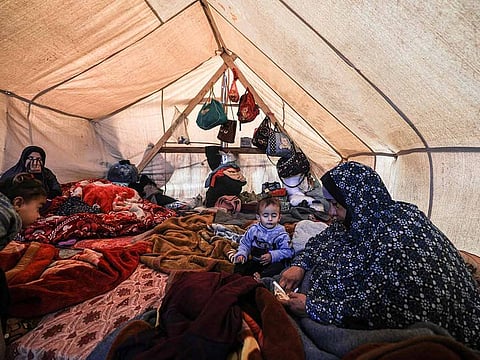Gaza’s Apocalypse: Principle must trump realpolitik now
The international community’s ‘responsibility to protect’ Gazans is severely lacking

Here’s the most pervasive — and for Palestinians and other Arabs the most existentially pressing — question being asked today: How many more lives must be taken, hearts broken and horrors inflicted before the international community acts upon its moral responsibility to step in and end the war of annihilation waged as we speak against the captive population of Gaza?
After all, the responsibility of this community to protect such a population from such mayhem, known as The Responsibility to Protect, or R2P, has been an important global principle since the unanimous adoption in New York City of The World Summit Document at the 2005 World Summit, the largest gathering of heads of state in history.
And if there has ever been a situation where the R2P needs to be applied in practice, the apocalypse people are living through in Gaza most decidedly meets that need.
No one will argue against the notion that the ongoing war there is like no other in recent memory. And if people have stopped comparing it to other wars it is because it appears to have no precedent, being among the deadliest and most destructive — not to mention one whose crucial historical context is often always left out.
Also Read: Battle for truth in Gaza’s media blockade
"Turns earth into liquid"
Consider the scale, if nothing else. This war has wreaked more death and destruction, proportionately, than the allied bombing in the Second World War, between 1942 and 1945, when the Allies bombed 51 major German cities and towns, destroying 40 to 50 per cent of their urban areas, which amounted to ten per cent of structures in Germany, compared to well over 80 per cent across Gaza, this according to Robert Pape, professor of political science at Chicago University, who teaches international security affairs with a focus on air power, and who was quoted in a trenchant piece that appeared in PBS News Online recently as describing the war in Gaza as being “one of the most intense civilian punishments in history and now sits comfortably in the top quartile of the most devastating military campaigns ever”.
This is clearly a war with an orgiastic bent that has indeed shown itself to be, at its core, retributive, an act of collective punishment directed against an overwhelmingly civilian population.
And it is no secret that much, if not all, of this death and destruction is caused by American-made weapons supplied to Israel by Washington — with no strings attached — weapons like the so-called Joint Direct Attack Munitions (JDAM), which include the deadly 1,000- and 2000-pound “bunker busters” that, in the words of Marc Garlasco, a former Pentagon official and war crimes investigator, “turns earth into liquid” and “pancakes entire buildings”, and means instant death not only to people on-site but to anyone caught within 1,200 feet of the blast.
Imagine, all this wreaked on a densely populated coastal enclave of just 140 square miles packed with well over two million men, women and children!
So long as US support of Israel’s military campaign remains unconditional, as it has done since the outbreak of war not quite five months ago, no matter how soft American President Joe Biden makes his comments and to what decibel he raises his voice in making them — in seeming sympathy with the suffering, let’s imagine, of the reported 17,000 children who are today walking alone in Gaza unaccompanied, separated as they are from parents and left with no hands to hold — it won’t make a darn bit of difference.
An end to the madness
What will make a difference is a permanent ceasefire and an end to the madness.
As I write this, Israel is gearing up to launch a campaign on Rafah that promises to outmatch any other of the lethal campaigns that preceded it.
And it will indubitably be lethal. Rafah, the southernmost city in Gaza bordering Egypt, with a pre-war population of 280,000, is now chock-a-block full of close to one and a half million souls, many displaced for the third, fourth or fifth time, sleeping in tents or in the open, who are being “told” by Israel to evacuate to “safe” places elsewhere in order to “avoid” harm as its fighter jets target the city from the air and its troops storm it on the ground.
But these folks have nowhere left to go, no sheltering refuge to find in a tormented strip of land that has been turned into a hellscape, where everything that once stood is pulverised to dust or bulldozed to the ground.
Yes, indeed, one of the most intense civilian punishments in history.
And why, pray tell, one of these Gazans may ask the international community, frame a law as morally ennobling as ‘The Responsibility to Protect’ when you are not prepared to see it applied here in our little strip of land where we have no protection? When, in the global dialogue of cultures, will principle trump realpolitik? And if not now, when?
— Fawaz Turki is a noted academic, journalist and author based in Washington DC. He is the author of The Disinherited: Journal of a Palestinian Exile
Sign up for the Daily Briefing
Get the latest news and updates straight to your inbox



